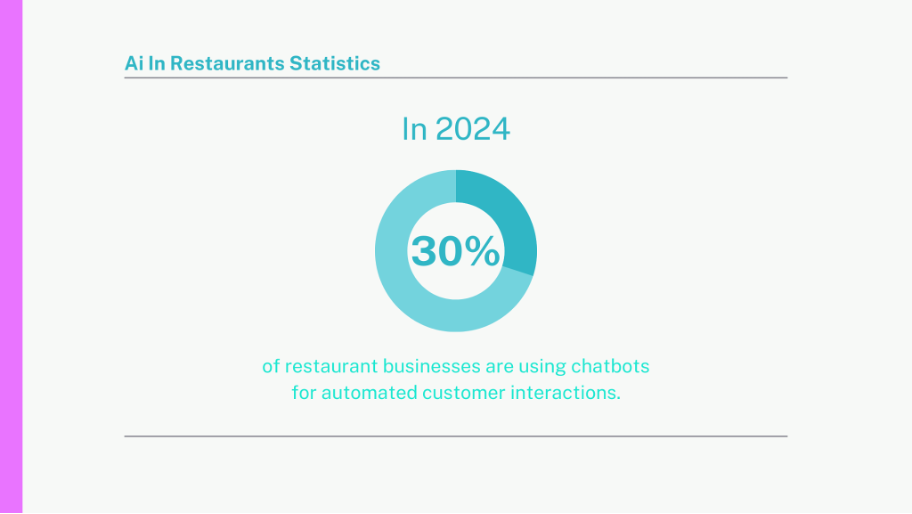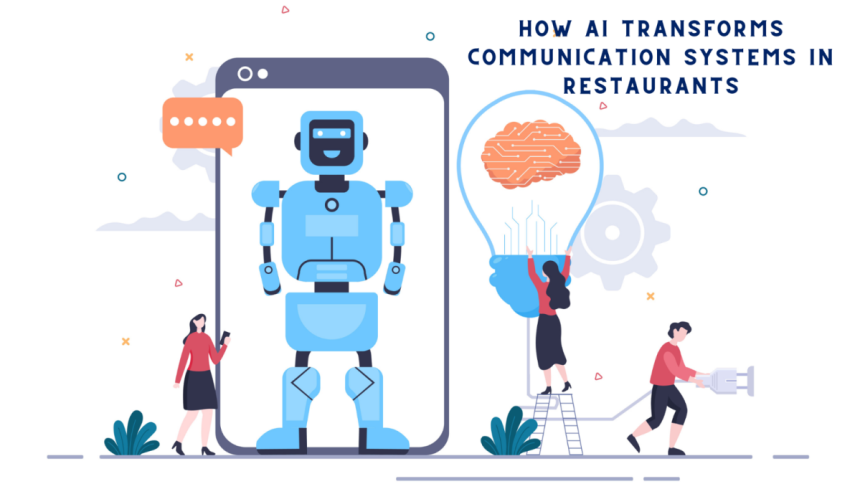In recent years, the restaurant industry has undergone a significant transformation, largely driven by integrating artificial intelligence (AI) into various operations. From enhancing customer interactions to streamlining backend processes, AI is revolutionizing the way restaurants communicate and function. Let’s explore how AI is reshaping communication systems in restaurants and what this means for the future of dining.
The Rise of AI in Restaurant Communication
The restaurant industry is embracing AI at an unprecedented rate. A recent study reveals that 35% of entrepreneurs plan to implement AI in their operations within the next year. This surge in adoption underscores how AI can enhance efficiency, improve customer experiences, and drive business growth.
AI plays a multifaceted role in transforming restaurant communication systems. It’s not just about replacing human interactions but augmenting them to create smoother, more personalized experiences for diners while simultaneously optimizing operations behind the scenes.
Customer-Facing AI Applications
One of the key innovations is the development of AI-driven solutions that automate and optimize various aspects of restaurant communication. For instance, AI-powered chatbots and virtual assistants can handle customer inquiries, manage reservations, and reduce the burden on staff and improve response times.
Another exciting advancement is the integration of AI with the best restaurant phone system, which uses intelligent call routing, automated responses, and real-time analytics to improve efficiency and customer satisfaction. These systems can manage high call volumes, provide detailed call records, and offer insights into customer preferences.
Personalized Customer Experience
AI excels in analyzing vast amounts of data to identify patterns and preferences. In restaurants, this translates to highly personalized dining experiences. AI systems are capable of:
- Analyze a customer’s history to suggest menu items they might enjoy
- Recommend wine pairings based on food choices
- Alert staff to dietary restrictions or allergies
- Tailor promotions to individual preferences
By leveraging AI for personalization, restaurants can create memorable experiences that keep customers coming back.
Voice-Enabled and Chatbot Systems
One of the most visible applications of AI in restaurants is the implementation of voice-enabled systems and chatbots. These technologies are revolutionizing how customers interact with restaurants, making the process more efficient and accessible.

IMAGE SOURCE: World Metrics Report 2024
Did you know? 84% of Gen Z and Millennials prefer to visit restaurants with self-serve kiosks. This statistic underscores the growing demand for AI-powered systems. Voice-enabled kiosks and mobile apps allow customers to make selections quickly and accurately, reducing wait times and minimizing errors. In addition, chatbots on restaurant websites and social media platforms can handle reservations and answer common questions, providing instant assistance 24/7.
Digital Assistants for Reservations and Queries
AI-powered digital assistants are transforming how restaurants manage reservations and handle customer inquiries. These systems can:
- Automatically book tables based on availability
- Send confirmation emails and reminders
- Answer frequently asked questions about menu items, hours, and policies
- Provide directions and parking information
By automating these tasks, AI frees up staff to focus on providing exceptional in-person service.
Operational Improvements Through AI
While customer-facing applications grab the spotlight, AI is also working behind the scenes to revolutionize restaurant operations.
Inventory and Supply Chain Management
AI-driven inventory management systems are game-changers in the restaurant industry. These sophisticated tools can:
- Predict inventory needs based on historical data and upcoming events
- Automatically restock supplies when they run low.
- Optimize stock levels to reduce waste and cut costs
- Track ingredient usage in real-time
The result? Reduced food waste, lower costs, and fewer instances of running out of popular items.
Labor Optimization and Scheduling
Staffing a restaurant efficiently can be challenging, but AI makes it easier. AI systems analyze factors such as:
- Historical sales data
- Weather forecasts
- Local events
- Employee availability and skills
Using this information, AI can create optimal staff schedules, ensuring the right number of employees are on hand during peak times without overstaffing during slower periods.
Kitchen Automation
In the kitchen, AI is enhancing food quality and speeding up service. AI-powered systems can:
- Monitor cooking temperatures and times for consistency
- Coordinate meal preparation to ensure all dishes for a table are ready simultaneously
- Analyze dish composition for quality control
- Optimize kitchen layouts for efficiency
These applications not only improve the dining experience but also reduce stress on kitchen staff.
Marketing and Customer Relationship Management (CRM)
AI is revolutionizing how restaurants approach marketing and customer relationship management. By leveraging advanced data analytics and machine learning algorithms, AI enables restaurants to create more targeted, effective marketing strategies and build stronger relationships with their customers.
AI excels at analyzing vast amounts of customer data to identify patterns and preferences. This capability allows restaurants to:
- Segment customers based on dining habits, preferences, and spending patterns
- Create highly targeted marketing campaigns tailored to specific customer groups
- Predict customer behavior and preferences, enabling proactive marketing efforts
For example, an AI system might identify a group of customers who frequently request vegetarian dishes and automatically send them promotions for new plant-based menu items.
One of the most powerful applications of AI in restaurant marketing is its ability to predict customer churn. By analyzing factors such as:
- Frequency of visits
- Changes in patterns
- Customer feedback and reviews
- Engagement with marketing communications
AI can identify customers at risk of churning and suggest targeted retention strategies. This proactive approach helps restaurants maintain their customer base and improve long-term profitability.
AI is transforming traditional loyalty programs into dynamic, personalized experiences. AI-powered loyalty systems can:
- Automatically adjust rewards based on individual customer behavior
- Suggest personalized offers to encourage repeat visits
- Identify and reward top customers with exclusive perks
These intelligent loyalty programs not only increase customer retention but also drive higher average spend per visit.
60% of restaurants that implemented AI technology say it’s critical in improving their processes, including marketing and CRM.
This statistic underscores the transformative impact of AI on restaurant operations, particularly in areas like marketing and customer relationship management. As AI technologies continue to evolve, we can expect even more sophisticated and effective marketing and CRM strategies in the restaurant industry.
Challenges and Ethical Considerations
While AI offers numerous benefits, it also presents challenges that restaurants must navigate:
- Privacy concerns: As AI systems collect and analyze customer data, ensuring data security and privacy becomes paramount.
- Job displacement: There’s concern that AI might replace human workers in certain roles.
- Technology dependence: Over-reliance on AI systems could lead to problems if those systems fail.
- Maintaining the human touch: Restaurants must strike a balance between efficiency and the personal interactions that many customers value.
Future Trends and Innovations
The future of AI in restaurants looks promising, with several exciting trends on the horizon:
- Predictive analytics: AI will increasingly be used for business forecasting and strategic decision-making.
- Robotic service: We may see more AI-driven robots assisting with tasks like food delivery and table bussing.
- Voice-activated everything: From placing a request to paying the bill, voice commands could become the norm.
- Hyper-personalization: AI will create even more tailored experiences, potentially customizing menu items for individual tastes and dietary needs.
Conclusion
AI is undeniably transforming restaurant communication systems, ushering in an era of enhanced efficiency, personalization, and customer satisfaction. From when a customer considers dining out to the post-meal follow-up, AI is working behind the scenes to create seamless, enjoyable experiences.
While challenges exist, the benefits of AI in restaurant communication are clear. As technology continues to evolve, we can expect even more innovative applications that will further revolutionize the dining experience.
FAQs
How can AI be used in the restaurant industry?
AI can enhance restaurant operations by efficiently managing reservations, table assignments, and staffing predictions. In the kitchen, AI-powered robots assist with food prep and cooking. AI chatbots handle customer inquiries, analyze preferences for personalized menu suggestions, and optimize delivery routes. These applications help restaurants run smoothly and provide better service.
How is AI transforming the food industry?
AI is transforming food production, processing, and delivery. In farming, AI drones monitor crops and predict yields. In food processing, AI enhances quality control and creates new flavors. It optimizes supply chains to reduce waste and ensure freshness, manages grocery store inventory, and predicts customer demand. AI apps assist with meal planning and nutrition tracking. These advancements make the food industry more efficient, innovative, and responsive to consumer needs.
How will AI transform customer service?
AI is set to make customer service faster and more personalized. Chatbots will handle simple queries 24/7, freeing human agents for complex issues. AI will analyze customer data to predict needs and offer proactive support. AI will help route customer inquiries to the best-qualified agent. It will provide real-time translation, breaking down language barriers. These changes will lead to quicker resolutions and more satisfying customer experiences.
Lynn Martelli is an editor at Readability. She received her MFA in Creative Writing from Antioch University and has worked as an editor for over 10 years. Lynn has edited a wide variety of books, including fiction, non-fiction, memoirs, and more. In her free time, Lynn enjoys reading, writing, and spending time with her family and friends.















